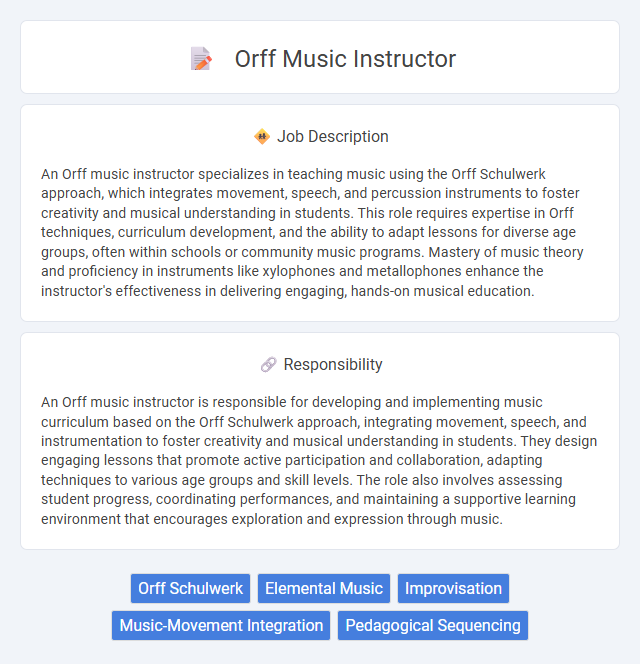
An Orff music instructor specializes in teaching music using the Orff Schulwerk approach, which integrates movement, speech, and percussion instruments to foster creativity and musical understanding in students. This role requires expertise in Orff techniques, curriculum development, and the ability to adapt lessons for diverse age groups, often within schools or community music programs. Mastery of music theory and proficiency in instruments like xylophones and metallophones enhance the instructor's effectiveness in delivering engaging, hands-on musical education.
Individuals with a passion for music education and strong interpersonal skills are likely to thrive as Orff music instructors. Those who enjoy working with children and adapting teaching methods to varied learning styles may find this role particularly suitable. Candidates who possess patience, creativity, and an understanding of the Orff approach might have a higher probability of success in this position.
Qualification
An Orff music instructor must possess a strong foundation in Orff Schulwerk methodology, typically demonstrated through certification or specialized training programs. Proficiency in teaching rhythm, improvisation, and the integration of movement, speech, and music to students of various ages is essential. A background in music education coupled with experience in classroom management and curriculum development enhances effectiveness in delivering engaging Orff-based lessons.
Responsibility
An Orff music instructor is responsible for developing and implementing music curriculum based on the Orff Schulwerk approach, integrating movement, speech, and instrumentation to foster creativity and musical understanding in students. They design engaging lessons that promote active participation and collaboration, adapting techniques to various age groups and skill levels. The role also involves assessing student progress, coordinating performances, and maintaining a supportive learning environment that encourages exploration and expression through music.
Benefit
An Orff music instructor role likely offers benefits such as enhancing students' creativity and musical skills through a unique, child-centered approach. The position may provide opportunities for professional growth and collaboration within a supportive educational environment. There is probable advantage in fostering a lifelong passion for music in diverse age groups.
Challenge
The challenge of working as an Orff music instructor likely involves adapting teaching methods to diverse student abilities while maintaining engagement through creativity. Incorporating movement, speech, and instruments to foster musical understanding can present complexities in curriculum design. The role probably demands continuous innovation to meet educational standards and individual learning needs effectively.
Career Advancement
Orff music instructors can advance their careers by gaining certification through recognized Orff-Schulwerk training programs and accumulating teaching experience across diverse educational settings. Transitioning into roles such as curriculum designers, educational consultants, or workshop facilitators provides opportunities for professional growth and broader impact within the music education community. Networking within professional organizations like the American Orff-Schulwerk Association enhances access to advanced development resources and leadership positions.
Key Terms
Orff Schulwerk
An Orff music instructor specializes in teaching the Orff Schulwerk approach, which integrates music, movement, speech, and drama into holistic education. This method emphasizes improvisation and creative expression using instruments like xylophones, metallophones, and recorders, fostering a dynamic and engaging learning environment. Expertise in child development and proficiency in rhythmic and melodic patterns are essential for effectively applying Orff Schulwerk principles in diverse classroom settings.
Elemental Music
Orff music instructors at Elemental Music specialize in teaching the Orff Schulwerk approach, integrating movement, speech, and instrument play to foster holistic musical development. These educators design interactive lessons that emphasize rhythm, improvisation, and ensemble skills using xylophones, metallophones, and percussion instruments. Elemental Music prioritizes hands-on learning and creativity, preparing students of all ages to engage deeply with music through this dynamic pedagogy.
Improvisation
An Orff music instructor specializing in improvisation cultivates creativity and musical expression through dynamic, hands-on learning techniques inspired by Carl Orff's methodology. Emphasizing movement, speech, and rhythm, instructors guide students in spontaneous musical creation using percussion instruments, enabling enhanced auditory skills and ensemble collaboration. Mastery of improvisation in Orff pedagogy fosters confidence and active participation, essential for developing versatile musicianship in diverse educational settings.
Music-Movement Integration
An Orff music instructor specializes in Music-Movement Integration, using rhythmic movement, speech, and body percussion to enhance musical understanding and creativity. This approach combines instruments such as xylophones and metallophones with physical activities, fostering kinesthetic learning and improving coordination. Expertise in Orff Schulwerk methodology ensures effective development of students' musical skills through active participation and embodied experiences.
Pedagogical Sequencing
An Orff music instructor specializes in teaching music through the Orff Schulwerk approach, emphasizing pedagogical sequencing to ensure effective skill development and musical understanding. This method involves structured progression from simple rhythmic patterns and movements to complex compositions, enhancing student engagement and learning outcomes. Mastery of pedagogical sequencing allows the instructor to scaffold lessons that build foundational skills while fostering creativity in a collaborative classroom environment.
 kuljobs.com
kuljobs.com